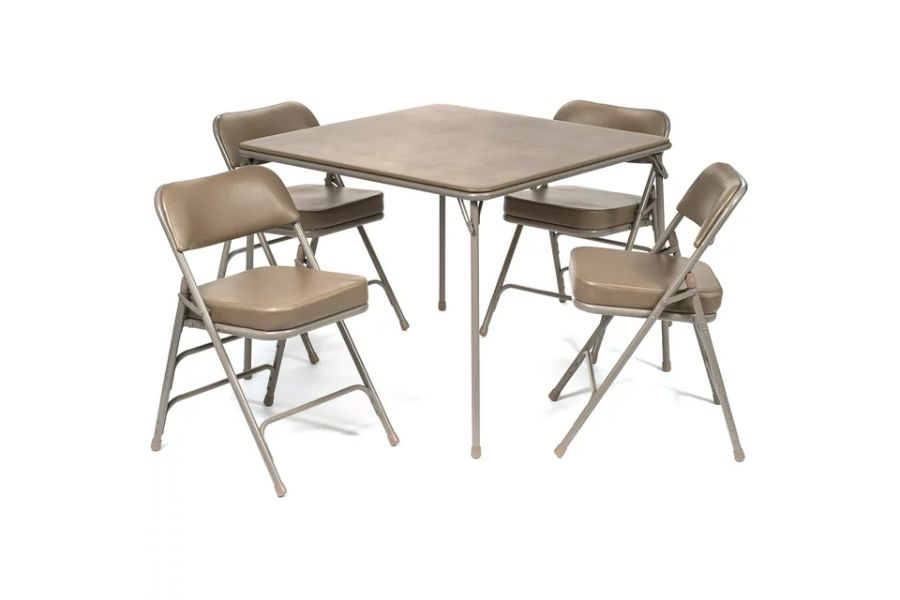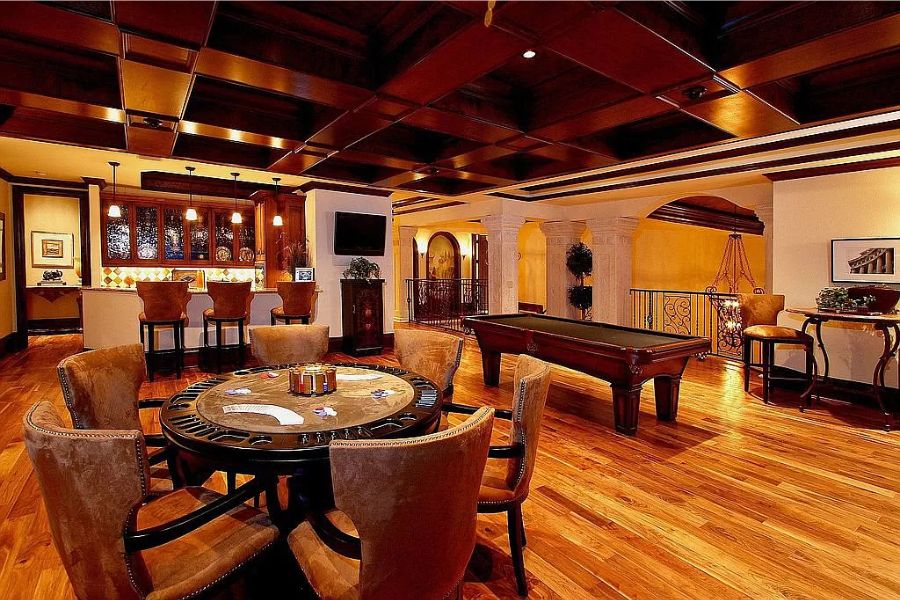To choose the right card table dimensions for your game nights, consider the available space, the number of players, game compatibility, and your budget while prioritizing comfort and ergonomics. Remember that choosing the right card table dimensions is a bigger deal than you might think! It can make or break the fun. In this article, we’ll guide you through the process of picking the perfect card table size to ensure your game nights are a hit.
Considerations for Choosing Card Table Dimensions
Let’s dive into the nitty-gritty of choosing the perfect card table dimensions for your game nights. It’s not just about picking any table; it’s about finding the one that suits your needs like a well-fitted glove. Here are some essential factors to consider:
Available Space
Measuring the Available Space: Before you start shopping, grab your measuring tape and assess the area where your card table will reside. Knowing your space limitations is crucial. If you haven’t decided on a space for it yet, we suggest you check out these awesome unfinished basement ideas.
Factors to Consider in the Gaming Area: Take note of any obstructions, like doors, furniture, or other items that might affect how you set up your table. You’ll want a clear and accessible gaming zone.
Number of Players
Determining the Typical Number of Players: Think about the size of your usual gaming group. Do you typically have a small gathering or host larger game nights? Knowing your player count is key.
Seating Capacity and Comfort: Consider how many people can comfortably sit around the table. Crowded games are no fun, so make sure everyone has ample space. Like how you’d want a ceiling fan in a kitchen, you should also consider adding a fan to your game room for air circulation.
Types of Card Games
Different Card Game Setups: Different card games have varying requirements in terms of space and seating. Are you playing poker, bridge, or a board game? Each has its own needs.
Tailoring Table Dimensions to Specific Games: Some games need more space for cards and chips, while others require less. It’s essential to match the table to the games you love.
Table Shape
Round vs. Rectangular Table vs. Square Card Table vs. Octagonal Table
There’s more than one shape in the card table world. Each comes with its advantages and disadvantages, so choose the one that best suits your preferences and space.
By carefully considering these factors, you’ll be well on your way to finding the ideal card table dimensions for your game nights. Keep reading to explore more about standard sizes, customization options, and everything you need to create a gaming space that’s as inviting as it is functional.
Standard Card Table Dimensions
Common Dimensions for Card Tables

Square Card Tables
The most common card table dimensions are around 34 to 36 inches square. This size comfortably accommodates four players for most card games.

Rectangular Tables
If you prefer rectangular card tables over square tables or a circular card table, the standard dimensions are often about 72 inches long by 36 inches wide. A rectangular card table offers more space for larger groups.

Round or Circular Tables
Round card tables typically have a diameter of 48 inches. Circular card tables or round card tables are a fantastic choice for games that require players to be closer to each other.
Industry Standards and Recommendations
- Height: Card tables usually have a standard height of around 28 to 30 inches. This height for different types of poker tables or card tables ensures that players can comfortably sit and reach their cards without strain.
- Foldability: Many standard card tables are designed to be foldable for easy storage when not in use. This feature is excellent if you have limited space.
How to Choose from Standard Sizes
- Consider Your Space: Refer back to the available space in your gaming area and the number of players you usually host. Ensure that the standard dimensions fit comfortably within your space regardless of whether it’s a round, square, or rectangular table.
- Game Compatibility: Think about the type of games you’ll be playing. For larger games with more players or components, a rectangular table might be a better fit. Smaller gatherings might do well with a round or square table.
- Versatility: If you have space constraints, a foldable round, rectangular or square table with standard dimensions can be a versatile choice. You can easily set it up for game nights and store it away afterward.
Understanding the standard card table dimensions will give you a solid foundation for making an informed decision. However, keep in mind that customization options are available if you have unique preferences or requirements.
Folding vs. Permanent Tables
One of the crucial decisions you’ll face when choosing a card table is whether to go with a folding table or a permanent one. Both options have their advantages and disadvantages, and the choice largely depends on your specific needs and space. Let’s weigh the pros and cons of each:
Advantages of Folding Tables
- Space-Saving: Folding tables are excellent for those with limited space. You can easily fold them up and stow them away when not in use, freeing up your space for other activities.
- Portability: If you enjoy gaming in different locations, folding tables are highly portable. You can take them to a friend’s house or even outdoors for game nights under the stars.
- Versatility: Folding tables are versatile and can serve multiple purposes. They can function as dining tables or additional seating for parties when you’re not gaming.
Disadvantages of Folding Tables
- Durability: While there are durable folding tables available, they may not be as robust as permanent tables. Frequent folding and unfolding can lead to wear and tear over time.
- Stability: Some folding tables may not be as stable as permanent ones, which can be a concern during intense games.
- Aesthetics: Folding tables might not offer the same level of customization and aesthetics as permanent tables.
Advantages of Permanent Tables
- Sturdiness: Permanent tables tend to be more stable and sturdy, providing a solid surface for games.
- Aesthetics: You can customize permanent tables to match your decor and personal style, creating a visually pleasing gaming space.
- Durability: Well-constructed permanent tables can last for generations with proper care.
Disadvantages of Permanent Tables
- Space Requirement: Permanent tables occupy space continuously, which can be a drawback if you have limited room for gaming.
- Less Portable: Unlike folding tables, permanent tables are not designed for portability. They can’t easily be moved to different locations.
- Cost: Custom permanent tables or high-quality ready-made ones can be more expensive upfront than folding options.
Ultimately, the choice between folding and permanent tables boils down to your priorities. If space is at a premium or you prefer the flexibility of gaming in various locations, a folding table might be your best bet. However, if you value sturdiness, aesthetics, and a more permanent gaming setup, a permanent table could be the ideal choice.
Material and Quality
The material and quality of your card table are pivotal factors influencing its durability, appearance, and overall performance during your game nights. There are various materials commonly used for card tables, each with its unique attributes.
Wood, renowned for its timeless elegance, allows for customization with diverse finishes; hardwoods such as oak, cherry, and mahogany stand out for their durability.
In contrast, Medium-Density Fiberboard (MDF) tables offer a budget-friendly option, albeit with potential durability trade-offs, often adorned with veneers for a wood-like appearance. Some tables incorporate metal frames to enhance stability, catering to heavy use, yet they may lack the warm aesthetics of wooden tables.
Plastic card tables, lightweight and easy to clean, are ideal for casual gaming but may not exude the sophistication of wood or metal. When assessing card table quality, several key considerations come into play: table thickness, with thicker tabletops generally indicating durability, while thinner ones may sag over time, potentially affecting gameplay.
Quality tables employ sturdy joinery methods like mortise and tenon or dovetail joints, avoiding visible screws or staples. A well-applied finish not only enhances aesthetics but also safeguards the table against spills and stains.
Sturdy leg designs reduce wobbling during intense games, often featuring reinforced legs, and checking the table’s weight capacity ensures it can support players and game components without compromising stability.
Additionally, high-quality tables often come with warranties, reflecting the manufacturer’s confidence in their product’s durability.
Budget Considerations
When choosing the ideal card table for your game nights within your budget, follow these steps: Set a spending limit, considering additional accessories. Balance quality and affordability, prioritizing well-constructed tables for a better gaming experience.
Take material costs into account; wood tables tend to be pricier than MDF or plastic ones. Decide between ready-made and custom tables, noting that customization often comes at a premium. Look for sales and discounts to secure a quality table at a lower cost, and explore secondhand options for potential savings. Factor in delivery costs as well. When it comes to delivery, dive into some valuable guidance and proper etiquette when tipping furniture delivery personnel.
If your dream table exceeds your budget, consider financing options, ensuring you understand the terms and interest rates.
Ready to Upgrade Your Game Night Experience?
Choosing the right card table dimensions and considering factors such as standard sizes, customization options, folding versus permanent tables, materials, and budget are essential steps in creating the perfect game setup.
A well-thought-out card table selection not only enhances your gaming experience but also sets the stage for memorable gatherings with friends and family.
Whether you opt for a standard table, invest in custom craftsmanship, or add thoughtful accessories, your game nights are poised for success, filled with laughter, strategy, and shared moments. So what are you waiting for? Start planning your next gathering with the perfect card table setup!










